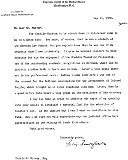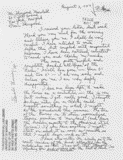88888888888888888888888888888888888888888888888888888888888888888888888888888888888
Donald Gaines Murray (May 24, 1914 – April 7, 1986, in Baltimore, Maryland) was an American attorney, the first African-American to enter the University of Maryland School of Law since 1890 as a result of winning the landmark civil rights case Murray v. Pearson in 1935.
Murray was born on May 24, 1914, in Philadelphia, the son of George Lee Murray and Cecilia Lillian Gaines Murray. He graduated from Frederick Douglass High School in 1929. Murray then earned a Bachelor of Arts degree from Amherst College in 1934.[1][2][3]
Murray sought admission to the University of Maryland School of Law on January 24, 1935, but his application was rejected on account of his race and his appeal to the Board of Regents of the university was unsuccessful. The case Murray v. Pearson was initiated by Alpha Phi Alpha fraternity as part of its widening social program; however, Murray was not a member of the fraternity.[4] The fraternity hired Belford Lawson, but by the time the case reached court, Murray was represented by Charles Hamilton Houston and Thurgood Marshall of the Baltimore National Association for the Advancement of Colored People (NAACP). Marshall argued the organization's policy of racial segregation was unconstitutional and argued in principle that "since the State of Maryland had not provided a comparable law school for blacks that Murray should be allowed to attend the white university."[5] and stated
The Judge issued a writ of mandamus ordering Raymond A. Pearson, president of the university, to admit Murray to the University of Maryland Law School.[5] The ruling was appealed to Maryland's highest court, the Court of Appeals, which affirmed the lower courts' rulings on January 15, 1936.[1][a]
Murray was admitted to the University of Maryland School of Law; however, he was not in a position to pay for tuition and books. Alpha Phi Alpha fraternity paid Murray's tuition and books from the time of his admittance to his graduation from law school.[4]
Murray went on to practice law in Baltimore with the firm of Douglass, Perkins and Murray. He was involved in a number of cases which led to the removal of the color barrier from the University of Maryland graduate schools.
Murray was a member of the Baltimore Urban League, American Civil Liberties Union and Kappa Alpha Psi fraternity.[7] He retired around 1971 and died at the age of 72 while in Baltimore's Lutheran Hospital after a lengthy illness.[8]
88888888888888888888888888888888888888888888888888888888888888888888888888888888888
Donald Gaines Murray and the Integration of the University Of Maryland School of Law
Donald Gaines Murray, Sr. (1914 - 1986) was the first African-American to enter the University of Maryland School of Law following the 1890 effort to prevent African-Americans from attending the school (see: "Colored Students Ruled Out"). Murray first sought admission to the University of Maryland School of Law on January 24, 1935, but his application was rejected based on race and his subsequent appeal to the Board of Regents of the university was unsuccessful. Upon this second rejection Murray began to work with lawyers at Washington D.C.'s Howard University to consider possible legal action. According to Juan Williams writing in his 1998 work Thurgood Marshall: American Revolutionary when Thurgood Marshall learned that some other lawyers were considering filing a suit against the State of Maryland and the University:
he [Marshall] got upset and wrote to [Charles Hamilton] Houston that he wanted to be first to file suit. He could not bear to allow any other lawyer to take the lead on this case.
By the time the case reached court, Murray was represented by Charles Hamilton Houston and Thurgood Marshall, with help from Baltimore based attorney Nicholas Gosnell. Marshall argued the organization's policy of racial segregation was unconstitutional and argued in principle that "since the State of Maryland had not provided a comparable law school for blacks that Murray should be allowed to attend the white university." and stated " What's at stake here is more than the rights of my client. It's the moral commitment stated in our country's creed."
Judge Eugene O'Dunne ordered Raymond A. Pearson, president of the university, to admit Murray to the University of Maryland Law School. The ruling was appealed to Maryland's highest court, the Court of Appeals, which affirmed the lower courts' rulings on January 15, 1936.
 Murray, who eventually graduated in 1938, [1939 catalog listing Murray's graduation] went on to practice law in Baltimore with the firm of Douglass, Perkins and Murray. He was involved in several subsequent cases which would lead to integration of other professional schools at the University of Maryland.
Murray, who eventually graduated in 1938, [1939 catalog listing Murray's graduation] went on to practice law in Baltimore with the firm of Douglass, Perkins and Murray. He was involved in several subsequent cases which would lead to integration of other professional schools at the University of Maryland.
Murray was a member of the Baltimore Urban League, American Civil Liberties Union and Kappa Alpha Psi Fraternity. He retired in the early 1970s and died at the age of 72. [Murray Obituary]
The Murray case was an involved, far-reaching effort and has been extensively studied by both historians and lawyers. It played an important role in the breaking down of barriers to education at other University of Maryland Schools and helped Thurgood Marshall to develop the arguments that would come to the fore in the Brown v. Board of Education. This site is intended to serve as a starting point for researchers interested in the subject but is not comprehensive.
Legal Materials
Petition for Writ of Mandamus in Baltimore City Circuit Court (1935).
Opinion of the Maryland Court of Appeals in Murray v. Pearson (1936).
Published Opinion: 169 Md. 478 (1936).
Briefs and other records from the Maryland State Archives
Archival Resources
There are a number of archival sources that detail the history of the Murray case. One of the most detailed was assembled by the Maryland State Archives and can be found at "From Segregation to Integration: The Donald Murray Case, 1935-1937." [This site requires a password from the State Archives to access and can be requested directly from the Archives].
Additional archival material may be located in the Papers of the NAACP. Part 3, The Campaign for Educational Equality [series A & B]. These records are available at the Thurgood Marshall Law Library, The University of Maryland School of Law.
The Thurgood Marshall Law Library's African Americans in the Law Special Collection contains several related items:
- 1934 - Post card from Charles Hamilton Houston to Juanita Jackson that alludes to the University of Maryland case and recommends that she "see Thurgood Marshall."
- 1937 - Letter from Murray to Thurgood Marshall seeking advice on how to prepare a petition for the Maryland Law Review.
- 1950 - Letter from Murray to Thurgood Marshall arranging a meeting to discuss 'new' University of Maryland cases.
- 1950 - Letter from Murray to Justice Felix Frankfurter regarding a possible scholarship fund for the son of Charles Hamilton Houston.
Books/Articles
Ball, Howard,
A Defiant life : Thurgood Marshall and the persistence of racism in America. 1st ed.
New York : Crown Publishers, c1998.
428 p., [16] p. of plates : ill. ; 25 cm.
Thurgood Marshall Law Library - KF8745.M34 B35 1998
Before Brown, beyond boundaries : commemorating the 50th anniversary of Brown v. Board of Education: A publication of The Association for the Study of African American Life and History.
Trenton, NJ : Africa World Press, c2004.
205 p. : ill. ; 28 cm. + 1 CD-ROM + 1 poster (56 x 42 cm.)
Thurgood Marshall Law Library - KF4155 .B44 2004
Bland, Randall Walton.
Justice Thurgood Marshall : crusader for liberalism : his judicial biography, 1908-1993.
Bethesda [Md.] : Academica Press, c2001.
364 p. ; 24 cm.
Thurgood Marshall Law Library - KF8745.M34 B547 2001
Davis, Michael D.
Thurgood Marshall : warrior at the bar, rebel on the bench.
New York, N.Y. : Carol Pub. Group, c1992.
400 p. : ill. ; 24 cm.
Thurgood Marshall Law Library - KF8745.M34 D38 1992
McNeil, Genna Rae.
Groundwork: Charles Hamilton Houston and the Struggle for Civil Rights.
Philadelphia University of Pennsylvania Press, 1985.
Electronic Book: Thurgood Marshall Law Library Collection of Civil Rights E-books
Rowan, Carl T.
Dream makers, dream breakers : the world of Justice Thurgood Marshall. 1st ed.
Boston : Little, Brown & Co., c1993.
475 p., 16 plates : ill. ; 24 cm.
Thurgood Marshall Law Library - E185.615 .R65 1993
Smith, J. Clay.
Emancipation : the making of the black lawyer, 1844-1944.
Philadelphia : University of Pennsylvania Press, c1993.
703 p. : ill. ; 24 cm.
Thurgood Marshall Law Library - KF299.A35 S65 1993
Williams, Juan.
Thurgood Marshall : American revolutionary.
New York : Times Books, c1998.
459 p., [16] p. of plates : ill. ; 25 cm.
Thurgood Marshall Law Library - KF8745.M34 W55 1998
The University of Maryland Versus Donald Gaines Murray (Editorial Comment)
The Journal of Negro Education, Vol. 5, No. 2 (Apr., 1936), pp. 166-174.
Donald G. Murray and the University of Maryland Law School. Maryland Humanities (Winter, 1992).
Taunya Lovell Banks. Setting the Record Straight: Maryland's First Black Women Law Graduates, 63 Md. L. Rev. 752 (2004). Available at Digital Commons@UM Carey Law. .
David S. Bogen. The Transformation of the Fourteenth Amendment: Reflections from the Admission of Maryland's First Black Lawyers, 44 Md. L. Rev. 939 (1985). Available at Digital Commons@UM Carey Law..
David S. Bogen, The First Integration of the University of Maryland School of Law, 84 Maryland Historical Magazine 39 (1989). Available at Digital Commons@UM Carey Law.
Bernad Meyer. Is There Cause for Jubilee? 50 Md. L. Rev. 227 (1991).
Garrett Power. Meade v. Dennistone: The NAACP's Test Case to "...Sue Jim Crow Out of Maryland with the Fourteenth Amendment," 63 Md. L. Rev. 773 (2004). Available at Digital Commons@UM Carey Law.Mark Tushnett. Thurgood Marshall as a Lawyer: The Campaign Against School Segregation, 1949-1950. 40 Md. L. Rev. 411 (1981).
Audio visual
Mark Tushnett. Thurgood Marshall as a Lawyer: The Campaign Against School Segregation, 1949-1950. 40 Md. L. Rev. 411 (1981).
Simple Justice (New Images Productions, Inc. ; produced by Yanna Kroyt Brandt ; directed by Helaine Head ; teleplay by John McGreevey ; story by John McGreevey, Avon Kirkland & Peter Cook).
Alexandria, VA : PBS Video, c1993.
3 videocassettes (46, 48, 40 min.) : sd., col. with b&w sequences ; 1/2 in.
Thurgood Marshall Law Library - Video KF4155 .S12 1993

